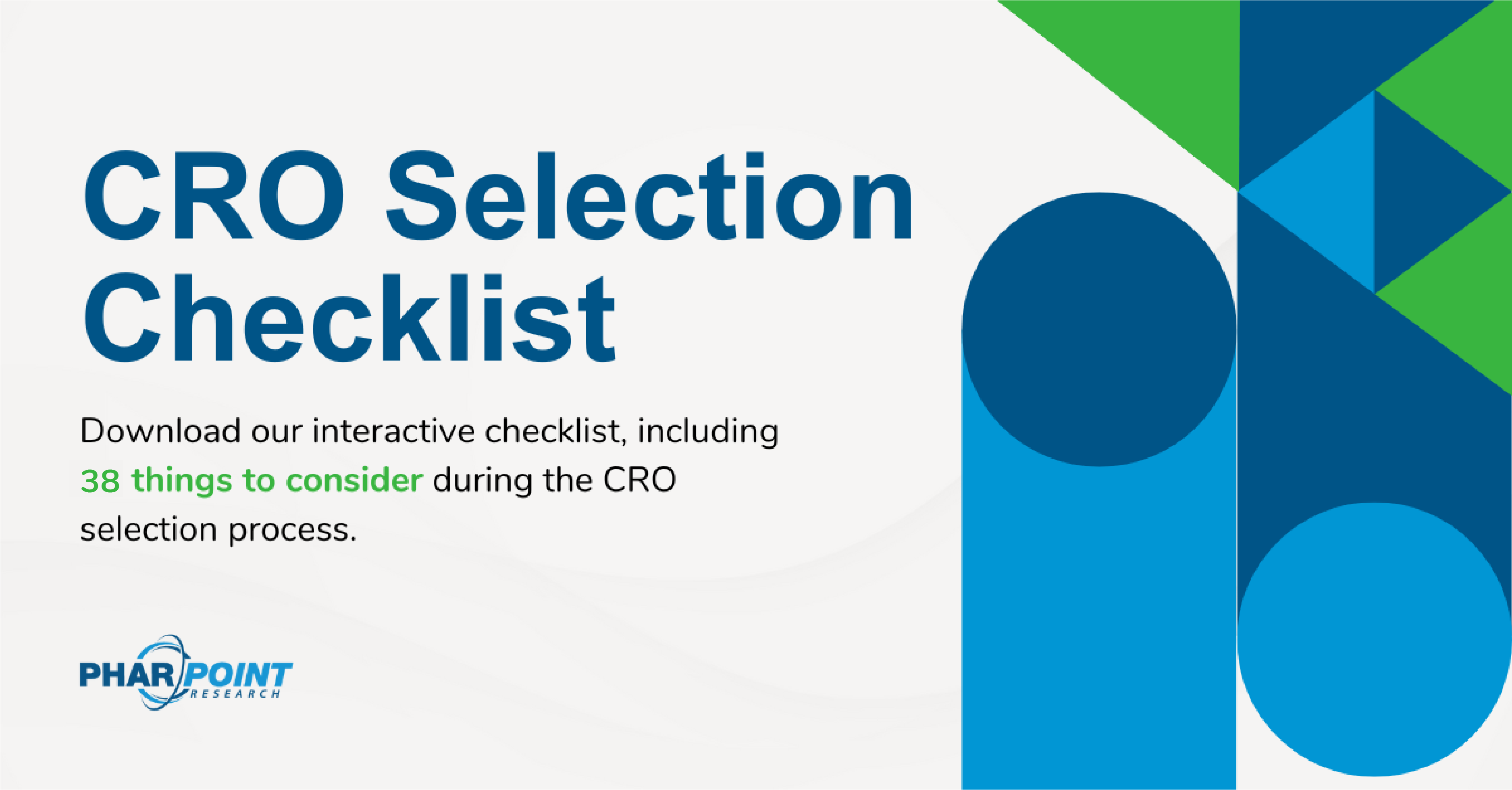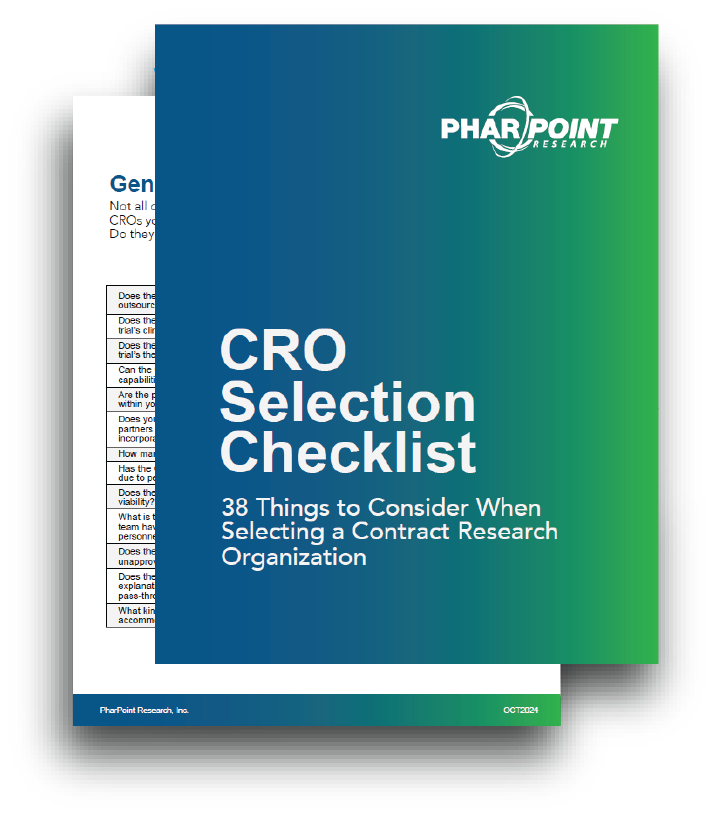How to Choose a CRO: Top Considerations for Sponsors
Explore essential questions and factors for selecting the right contract research organization (CRO) (+ download our companion CRO Selection Checklist outlining 38 CRO selection criteria).

Explore essential questions and factors for selecting the right contract research organization (CRO) (+ download our companion CRO Selection Checklist outlining 38 CRO selection criteria).
You already know that the contract research organization (CRO) you partner with can be the difference between a smooth clinical trial and one filled with delays, budget overruns, or missed milestones.
Ultimately, there is no one-size-fits-all approach, and the “right” CRO for you is the one that is the best match for your individual needs and preferences. So how should you choose a CRO, and what questions should you be asking your potential partners? In this guide, we highlight key criteria for choosing a CRO.
(Prefer a quick checklist covering 38 key considerations for CRO selection? Click here to download a copy of our CRO Selection Checklist.)
When sponsors think about how to choose a CRO, the first step is making sure the basics line up. At its core, this means confirming that the CRO has the right mix of services, expertise, and basic infrastructure to handle your trial without unnecessary risks or surprises. A CRO’s capabilities aren’t just about what they can do in theory – they should be able to demonstrate how they have successfully delivered in situations similar to yours.
Not every CRO is set up to handle every trial type. Ask whether they offer the exact services you plan to outsource and if they’ve executed studies in your phase and therapeutic area. While experience within the specific patient population your trial involves is often helpful, it is not always necessary – especially if, for instance, you’re working in a rare indication.
If a CRO does not have direct experience in your area of focus but feels they can still adequately support your needs, they should be able to explain how their team has supported trials with similar challenges.
Even if a CRO’s organization experience looks solid on paper, smooth trial operations are reliant on the specific individuals assigned to a study. Consider whether the proposed team members have the expertise to anticipate common challenges in your indication and phase – but don’t stop there.
As you meet proposed team members, pay attention to how they describe cross-functional collaboration. Are they highlighting the processes that will enable them to work together throughout a study? Just as importantly, how will they integrate with your internal team? Smooth communication, clear escalation pathways, and a demonstrated ability to collaborate across functions is just as important as technical expertise.
Finally – and perhaps most importantly – be sure to dig into exactly how the team members you meet will be involved in your study to avoid any team bait-and-switch tactics. Ask plainly: in what scenarios will these proposed team leads be removed from my trial?
Many CROs rely on subcontracted vendors for areas like central labs, imaging, or patient recruitment. This is not inherently a red flag – a CRO doesn’t need every service in-house to run a successful trial. What matters is how those vendors are managed and integrated. Sponsors should also note that some CROs add surcharges on top of vendor costs, so be sure to ask for transparency around pricing upfront.
It is also worth exploring the nature of the relationship a CRO has with their subcontractors. Is this a vendor the CRO has worked with repeatedly and trusts, or a newer partner? Has the CRO’s quality assurance team audited this partner, and what did that audit involve? Understanding who will oversee the vendor (e.g., the project manager, a functional lead, or perhaps another role) can clarify accountability.
Finally, depending on the nature of the service a subcontractor is providing, it may be important to ask whether these partners will participate in study kickoff meetings and cross-functional planning sessions.
Has the CRO had studies withdrawn in the last three years due to performance? If so, why? You’ll also want to look at the financial stability and longterm viability of potential CRO partners. A CRO with a shaky financial position may cut corners on staffing or face acquisition, both of which can disrupt your trial midstream.
Don’t hesitate to ask for references or case studies that reflect how they’ve handled challenges, not just successes.
Clinical trials are complex, and challenges are inevitable. While robust planning and risk management can help, studies rarely unfold exactly as expected. This is why it’s critical to choose a CRO that can quickly identify and resolve potential issues. As you speak with potential partners, ask what their escalation pathway looks like. When problems arise, do you have direct access to a director- or executive-level decision maker, or will concerns get stuck at the project team level? A CRO that empowers its team to leverage senior internal resources – and that ensures leadership team involvement when needed – demonstrates a commitment to proactive problem-solving and trial continuity.
A CRO’s proposal sets the foundation for your working relationship, and should be crafted to provide clarity. Look for:
Technical expertise and capabilities matter, but sponsors who’ve been through multiple trials know that the best partnerships are build on more than just operational skill. When evaluating how to choose a CRO, don’t overlook soft skills and a work-style match. The right CRO should feel like an extension of your team: trustworthy, aligned in values, and invested in your success.
The size of the CRO you choose can indirectly have a large impact on your experience as a sponsor. If you’re a smaller biotech company, working with a massive global CRO may leave you feeling like a small fish in a big pond, overlooked and deprioritized when resources get stretched. The key here is in finding a partner where your study can be a top priority rather than another line item.
Clinical trials are often quite long, which makes it especially important to partner with a CRO whose approach aligns with yours.
For example, if your team sees frequent check-ins as essential for alignment, but your CRO considers them unnecessary, friction will build quickly. Before you select a CRO, take a step back to clearly outline what matters most to you and your team. Use that insight to prioritize asking questions that matter most – whether it’s their approach to communication, decision making, collaboration, etc.
When both teams see eye to eye on how to work together, smoother trial operations can follow.
Ask whether the CRO can provide any success stories or testimonials that demonstrate acting as a cohesive extension of a sponsor’s team. Strong teams should be able to demonstrate real-world examples of collaboration, adaptability, and proactive problem-solving. A partner that can offer guidance when necessary to protect your study quality and outcomes can be invaluable.
CRO staff turnover directly affects your study. If employees aren’t supported, valued, or retained, you may end up with a constantly rotating cast of study team members rather than consistent partners. Ask about how each CRO invests in their people, from training and professional development to workload management.
Clinical research is highly regulated, with patient safety, data integrity and trial credibility all on the line. A trustworthy CRO should be able to demonstrate how compliance is built into every layer of their operations.
Has the CRO been audited lately, and what was the nature of these findings? Beyond just audit findings, it is often beneficial to ask how many studies the CRO has had pulled due to quality concerns in recent years.
Can the CRO provide a list of standards to which their SOPs adhere? Well-written SOPs aligned to industry-supported standards show that the organization is structured, consistent, and prepared for inspection. Ask whether SOPs are updated regularly and how these updates are communicated across staff.
Use the form below to download the full list of considerations in of our “CRO Selection Checklist” as you start your hunt.

RELATED RESOURCES